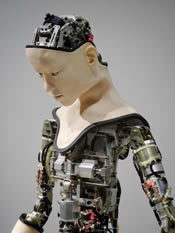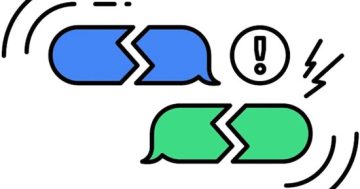Nick Whigham* says the tech giant has been skewered over the ‘deliberate deception’ of its latest product, with critics claiming it proves Silicon Valley is ethically lost.

Photo: Franck V
The crowd may have cheered in stunned disbelief but the reaction to Google’s latest capability has prompted a backlash from those concerned about the ethics of intelligent robots taking over.
In one of the most chilling technological demonstrations to date, the internet giant showed its digital assistant could mimic a human over the phone so convincingly the person on the other end of the line had no idea they were talking to a machine.
In one demonstration, the artificially intelligent bot called a hairdresser and booked a haircut for its client.
In another, the bot made a restaurant reservation after inquiring about wait times to a worker oblivious she was speaking to a computer.
The company unveiled the technology this week at its annual developers conference, Google I/O, alongside other artificially intelligent additions that could write emails and drive cars and generally cut humans out of the picture.
Zeynep Tufekci, a technologist and associate professor at the University of North Carolina who regularly dispels the benevolent aura of the tech giants for The New York Times, has lashed out at Google’s latest showcase experiment.
“Google Assistant making calls pretending to be human not only without disclosing that it’s a bot, but adding ‘ummm’ and ‘aaah’ to deceive the human on the other end with the room cheering it … horrifying,” she said.
“Silicon Valley is ethically lost, rudderless and has not learned a thing.”
“That the many in Google did not erupt in utter panic and disgust at the first suggestion of this … is incredible to me.”
In a fiery Twitter outburst, she argued tech companies have a responsibility to properly delineate between humans and algorithms.
“As digital technologies become better at doing human things, the focus has to be on how to protect humans, how to delineate humans and machines, and how to create reliable signals of each,” Tufekci said.
“This is straight up, deliberate deception. Not okay.”
Australian robotics and artificial intelligence Professor Toby Walsh, from the University of New South Wales, also raised concerns and invoked the notion of what he calls “Turing’s Red Flag”.
The idea takes its name from the Turing test, developed by famed computer scientist Alan Turing in 1950, which is a test of a machine’s ability to exhibit intelligent behaviour equivalent to, or indistinguishable from, that of a human.
Professor Walsh contends it’s fundamental to ensure the distinction is maintained between humans and computer intelligence.
“Where is the Turing Red Flag? Computers should not pretend to be humans,” he wrote on social media alongside a link to a Google blog post explaining its new capability.
Professor Walsh and Professor Tufekci are not alone in their assertion.
Meanwhile, Australian tech leader Matt Barrie posited his own theory about where the data hungry tech giant wants to take things, calling Google Duplex a trojan horse that will inevitably be used to learn more about everything we’re doing.
“I see where this is going,” he wrote on Twitter.
“Google Duplex is the Trojan horse when this call flips.”
“Google will answer phones, take payments and do appointment setting.”
“They will know everything about your business.”
Not everyone was quick to concentrate on the negatives though, with some pointing out the potential efficiency benefits and ability to dissolve language barriers.
Google knew the demonstrations would provoke some uncomfortable feelings.
According to Business Insider, company execs knew the phone call examples of the tech would raise as many concerns as it would applause.
Sources from the company said it may not actually go into the wild in its current incarnation, until it could be made less, well, creepy.
According to the report, one Google manager said the final product could, for example, require Google Assistant to notify a person that they weren’t talking to a human before starting a conversation.
Additionally the “ums” and “aahs” could be cut if that’s what is needed to make people more comfortable.
While Wired Magazine predicted the technology will prove to be overhyped, there’s little doubt Google’s increased AI capability represents another step in big tech’s AI arms race.
“The Google Duplex technology is built to sound natural, to make the conversation experience comfortable,” Google said in its blog post.
“It’s important to us that users and businesses have a good experience with this service, and transparency is a key part of that.”
“We want to be clear about the intent of the call so businesses understand the context.”
“We’ll be experimenting with the right approach over the coming months.”
* Nick Whigham is news and technology reporter for News.com.au HQ in Sydney. He tweets at @NWWhigham.
This article first appeared at www.news.com.au.










